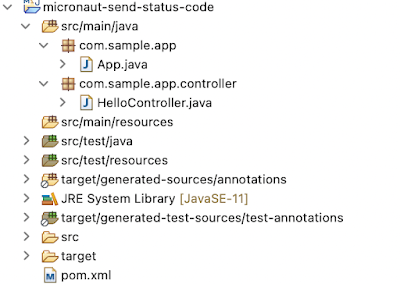Sometimes you might want to send the response code alone, you can do that by simply returning HttpStatus from the controller method.
Example
@Get("/health")
public HttpStatus ping() {
return HttpStatus.OK;
}
Find the below working application.
Step 1: Create new maven project ‘micronaut-send-status-code’.
Step 2: Update pom.xml with maven dependencies.
pom.xml
<?xml version="1.0" encoding="UTF-8"?>
<project xmlns="http://maven.apache.org/POM/4.0.0"
xmlns:xsi="http://www.w3.org/2001/XMLSchema-instance"
xsi:schemaLocation="http://maven.apache.org/POM/4.0.0 http://maven.apache.org/xsd/maven-4.0.0.xsd">
<modelVersion>4.0.0</modelVersion>
<groupId>com.sample.app</groupId>
<artifactId>micronaut-send-status-code</artifactId>
<version>0.1</version>
<packaging>jar</packaging>
<parent>
<groupId>io.micronaut</groupId>
<artifactId>micronaut-parent</artifactId>
<version>3.7.4</version>
</parent>
<properties>
<packaging>jar</packaging>
<jdk.version>11</jdk.version>
<release.version>11</release.version>
<micronaut.version>3.7.3</micronaut.version>
<micronaut.runtime>netty</micronaut.runtime>
<exec.mainClass>com.sample.app.App</exec.mainClass>
</properties>
<repositories>
<repository>
<id>central</id>
<url>https://repo.maven.apache.org/maven2</url>
</repository>
</repositories>
<dependencies>
<dependency>
<groupId>io.micronaut</groupId>
<artifactId>micronaut-inject</artifactId>
<scope>compile</scope>
</dependency>
<dependency>
<groupId>io.micronaut</groupId>
<artifactId>micronaut-validation</artifactId>
<scope>compile</scope>
</dependency>
<dependency>
<groupId>io.micronaut</groupId>
<artifactId>micronaut-http-client</artifactId>
<scope>compile</scope>
</dependency>
<dependency>
<groupId>io.micronaut</groupId>
<artifactId>micronaut-http-server-netty</artifactId>
<scope>compile</scope>
</dependency>
<dependency>
<groupId>io.micronaut</groupId>
<artifactId>micronaut-jackson-databind</artifactId>
<scope>compile</scope>
</dependency>
<dependency>
<groupId>jakarta.annotation</groupId>
<artifactId>jakarta.annotation-api</artifactId>
<scope>compile</scope>
</dependency>
<dependency>
<groupId>ch.qos.logback</groupId>
<artifactId>logback-classic</artifactId>
<scope>runtime</scope>
</dependency>
<dependency>
<groupId>io.micronaut.test</groupId>
<artifactId>micronaut-test-junit5</artifactId>
<scope>test</scope>
</dependency>
<dependency>
<groupId>org.junit.jupiter</groupId>
<artifactId>junit-jupiter-api</artifactId>
<scope>test</scope>
</dependency>
<dependency>
<groupId>org.junit.jupiter</groupId>
<artifactId>junit-jupiter-engine</artifactId>
<scope>test</scope>
</dependency>
</dependencies>
<build>
<plugins>
<plugin>
<groupId>io.micronaut.build</groupId>
<artifactId>micronaut-maven-plugin</artifactId>
</plugin>
<plugin>
<groupId>org.apache.maven.plugins</groupId>
<artifactId>maven-compiler-plugin</artifactId>
<configuration>
<!-- Uncomment to enable incremental compilation -->
<!-- <useIncrementalCompilation>false</useIncrementalCompilation> -->
<annotationProcessorPaths
combine.children="append">
<path>
<groupId>io.micronaut</groupId>
<artifactId>micronaut-http-validation</artifactId>
<version>${micronaut.version}</version>
</path>
</annotationProcessorPaths>
</configuration>
</plugin>
</plugins>
</build>
</project>
Step 3: Define HelloController class.
HelloController.java
package com.sample.app.controller;
import io.micronaut.http.HttpStatus;
import io.micronaut.http.annotation.Controller;
import io.micronaut.http.annotation.Get;
@Controller("/api")
public class HelloController {
@Get("/health")
public HttpStatus ping() {
return HttpStatus.OK;
}
}
Step 4: Define main application class.
App.java
package com.sample.app;
import io.micronaut.runtime.Micronaut;
public class App {
public static void main(String[] args) {
Micronaut.run(App.class);
// Use this if you want the beans to be initialized eagerly
/*
* Micronaut.build(args) .eagerInitSingletons(true) .mainClass(App.class)
* .start();
*/
}
}
Total project structure looks like below.
Build the project using mvn package command.
Navigate to the folder where pom.xml is located and execute the command ‘mvn package’.
Upon command successful execution, you can see the jar file ‘micronaut-send-status-code-0.1.jar’ in project target folder.
$ ls ./target/
classes
generated-sources
generated-test-sources
maven-archiver
maven-status
micronaut-send-status-code-0.1.jar
original-micronaut-send-status-code-0.1.jar
test-classes
Execute below command to run the application.
java -jar ./target/micronaut-send-status-code-0.1.jar
Execute below command to test the api.
curl -v --location --request GET 'http://localhost:8080/api/health'$curl -v --location --request GET 'http://localhost:8080/api/health'
Note: Unnecessary use of -X or --request, GET is already inferred.
* Trying 127.0.0.1:8080...
* Connected to localhost (127.0.0.1) port 8080 (#0)
> GET /api/health HTTP/1.1
> Host: localhost:8080
> User-Agent: curl/7.79.1
> Accept: */*
>
* Mark bundle as not supporting multiuse
< HTTP/1.1 200 OK
< date: Fri, 2 Dec 2022 16:29:36 GMT
< connection: keep-alive
< transfer-encoding: chunked
<
* Connection #0 to host localhost left intact
You can download this application from this link.

No comments:
Post a Comment